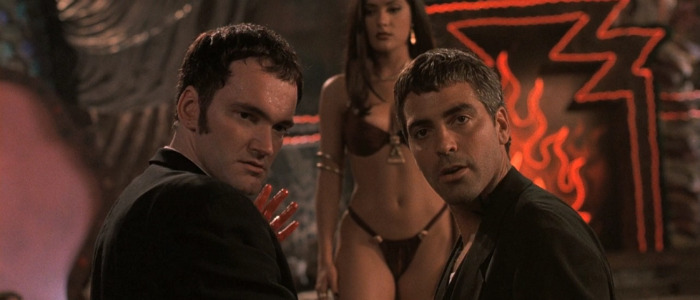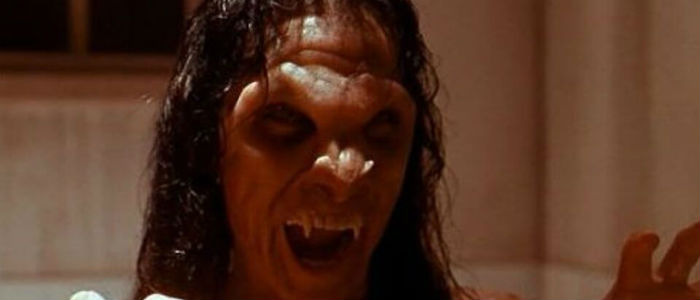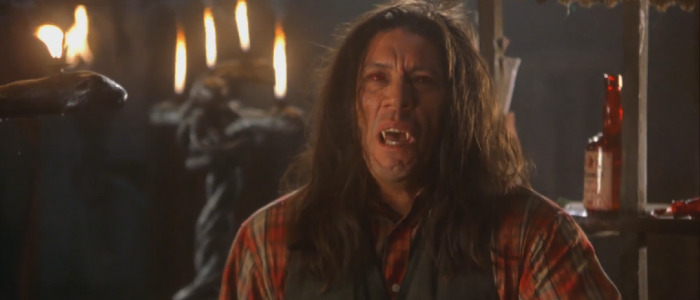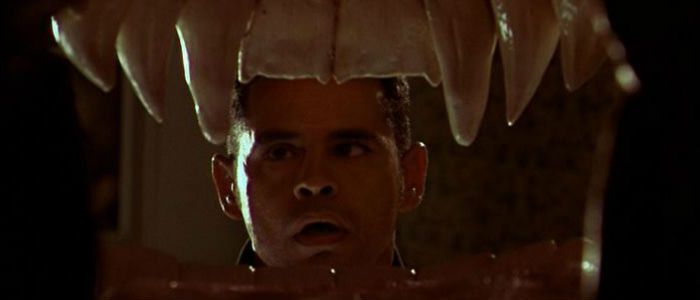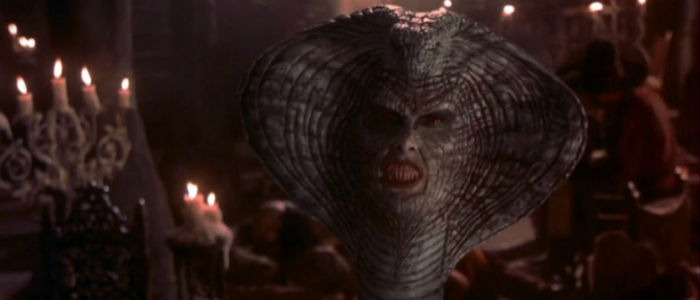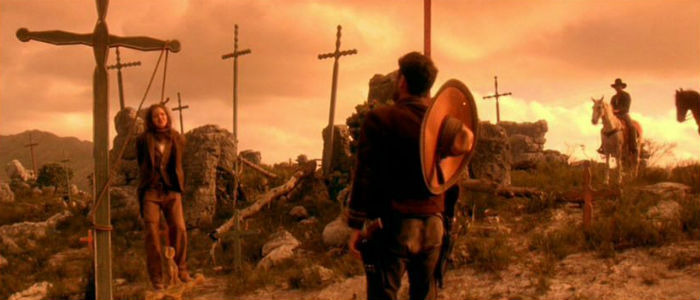Believe It Or Not, One Of The Direct-To-Video 'From Dusk Till Dawn' Sequels Is Actually Pretty Good
(Welcome to DTV Descent, a series that explores the weird and wild world of direct-to-video sequels to theatrically released movies. In this edition, we bite down hard on two sequels to Robert Rodriguez's vampire/crime genre mash-up From Dusk Till Dawn.)
The '90s were a wild time in Hollywood, and few production companies embodied that like Miramax. There were far bigger crimes going on behind their walls, from assault to the intentional buying and burying of foreign films, but their Dimension label also made a lucrative business out of sequelizing horror movies that really didn't need a sequel. Children of the Corn, The Crow, Mimic, The Prophecy, and more all became franchises thanks to underwhelming follow-ups that almost exclusively went straight to video. We'll get to those eventually, but this week's DTV Descent is about to get busy with some vampires.
Keep reading for a look at the two sequels – okay fine, one's a prequel, but let's not get stuck on the details – to Robert Rodriguez's 1996 action/horror/comedy From Dusk Till Dawn. Do either of them explain why the heroes on the posters are always left-handed? Does Danny Trejo play the same character in all three films? And most importantly, is it true – in a startling break with this column's track record – that one of these movies is actually pretty damn good?!
The Beginning
A pair of vicious fugitives are cutting a bloody swath across Texas on their way to Mexico, and they're not letting anything or anyone stand in their way. Seth Gecko (George Clooney) is a career criminal who robs banks and avoids hurting people unless he has to, but his brother Richard (Quentin Tarantino) has no such scruples. With dead law enforcement and civilians in their rear-view mirror and the rest of the state close behind, they take a retired preacher (Harvey Keitel) and his two teenage kids (Juliette Lewis, Ernest Liu) hostage, hop in their RV, and cross the border into Mexico. So far so bad, but killers and would-be victims alike are soon forced to join forces when an even greater threat rears its ugly, sharp-toothed head. Well, heads, plural, because the gang arrives at a bar that employs vampires. Ruh roh!
The DTV Plot
From Dusk Till Dawn 2: Texas Blood Money (1999) sees an escaped convict pull together four other crooks for a robbery south of the border. They agree to meet at a remote motel, but when one crosses paths with vampires and comes out the other end as a vamp himself, he starts infecting the others in the gang...but still moves forward with the nighttime robbery. Buck soon catches wind of the undead angle, but his attempt to stay alive finds resistance from vampires and law enforcement alike.From Dusk Till Dawn 3: The Hangman's Daughter (2000) moves a century into the past to follow famed writer Ambrose Bierce's (Michael Parks) journey south into Mexico, where he eventually disappeared. That part's true! He goes looking to join Pancho Villa's revolutionary army, but he runs into some otherworldly trouble along the way when he finds himself in the company of a ragtag group of outlaws, Christians, and morally bankrupt authorities. They all converge on a rural hotel bar overrun by vampires and have to join forces if they want to see another sunrise.
Talent Shift
1996's From Dusk till Dawn was Robert Rodriguez's third feature film and Tarantino's sixth produced screenplay, and both filmmakers' trademarks are fully on display. Energetic visual flourishes, quotable, idiosyncratic dialogue, and a cast that is equally eclectic and appealing. Clooney side-steps away from his nice guy image on ER and back into the world of horror/comedies where he started with the likes of Return to Horror High (1987) and Return of the Killer Tomatoes (1988), and it's a rare genre appearance for Keitel outside of Saturn 3 (1980) and The Last Temptation of Christ (1988). We also get fun turns from Tom Savini, Salma Hayek, Danny Trejo, Fred Williamson, Michael Parks, John Hawkes, John Saxon, Kelly Preston, and Cheech Marin (in three different roles).
The sequels offer a visible drop in name talent despite the return of Trejo and Parks and the addition of Robert Patrick, Bo Hopkins, Bruce Campbell, and Sônia Braga. But, and this cannot be overstated, they're still all better actors than Tarantino.
How the Sequel and Prequel Respect the Original
The two follow-ups were made around the same time and opened less than a year apart, but they take opposing paths in relation to the original while retaining the most important and relevant element. Texas Blood Money keeps the crooks versus vampires angle while changing up the locale and ramping up the more traditional action. Director Scott Spiegel (Intruder, 1989) taps into Rodriguez's energetic spirit on occasion with creative camera movements and stylized POVs like the one above from inside a vampire's mouth.
The Hangman's Daughter sticks far closer to the original in structure, even ending with a big third act brawl inside a vamp bar. Both tacts are equally respectable, but the prequel takes far better advantage of its choices and follows Rodriguez's lead by sticking strictly with action and character for nearly 50 minutes before the bloodsuckers first start gnashing their teeth. Both films also rely far more on practical effects than optical/CG, and while the prequel does better in that regard, both deserve credit for sticking with what works best more often than not. The prequel, in particular, has a blast with creature work in the third act: an ancient vamp is sliced open, letting loose hundreds of bats, a hybrid creature has his monstrous testicles sliced off, and gunfire, stabbings, and beheadings rule the day. It's good family fun. (Except for the bit where the father and daughter kiss with tongue, obviously.)
How the Sequel and Prequel Shit on the Original
Rodriguez's original film waits a full 45 minutes before arriving at the infamous Titty Twister bar where the vampires hang, and it's another 15 before the fangs even come out. That's an impressive display of confidence in the cast, script, and production as a whole, and it's a confidence the sequel is sorely lacking. Texas Blood Money opens with a scene from a fake movie teasing tons of carnivorous bats, and then the actual vampires show up just 25 minutes in. The film also fails to deliver on the horror half of its story in any memorable way. The vampires are fairly bland and the effects, while mostly practical, consist of blood, fangs, and colored contact lenses alongside some gnarly bat action. It's ultimately guilty of the worst of cinematic sins: dullness.
The Hangman's Daughter is a solid piece of vampire/action, and its only real offense is a handful of CG stumbles during scenes populated by otherwise fun, creative, and wet practical effects work.
Conclusion
DTV sequels historically range between abysmal and not good, and Texas Blood Money definitely falls toward the latter end of that scale. It's not bad, per se, but it's just surprisingly flat and boring. The Hangman's Daughter, though, breaks that trend – at least as far as a prequel can break a sequel trend – to deliver an engaging mix of characters, an under-appreciated performance by Michael Parks, some sharp dialogue, plenty of gory creature interactions, and some fun nods to Rodriguez's original.
The competition hasn't exactly been fierce, but if I was ranking DTV sequels/prequels covered here this slice of period horror would currently be sitting at the top of the heap. Even better? You can skip part two altogether. (And as a quick answer to the three questions posed in the intro... no, no, and yes.)

